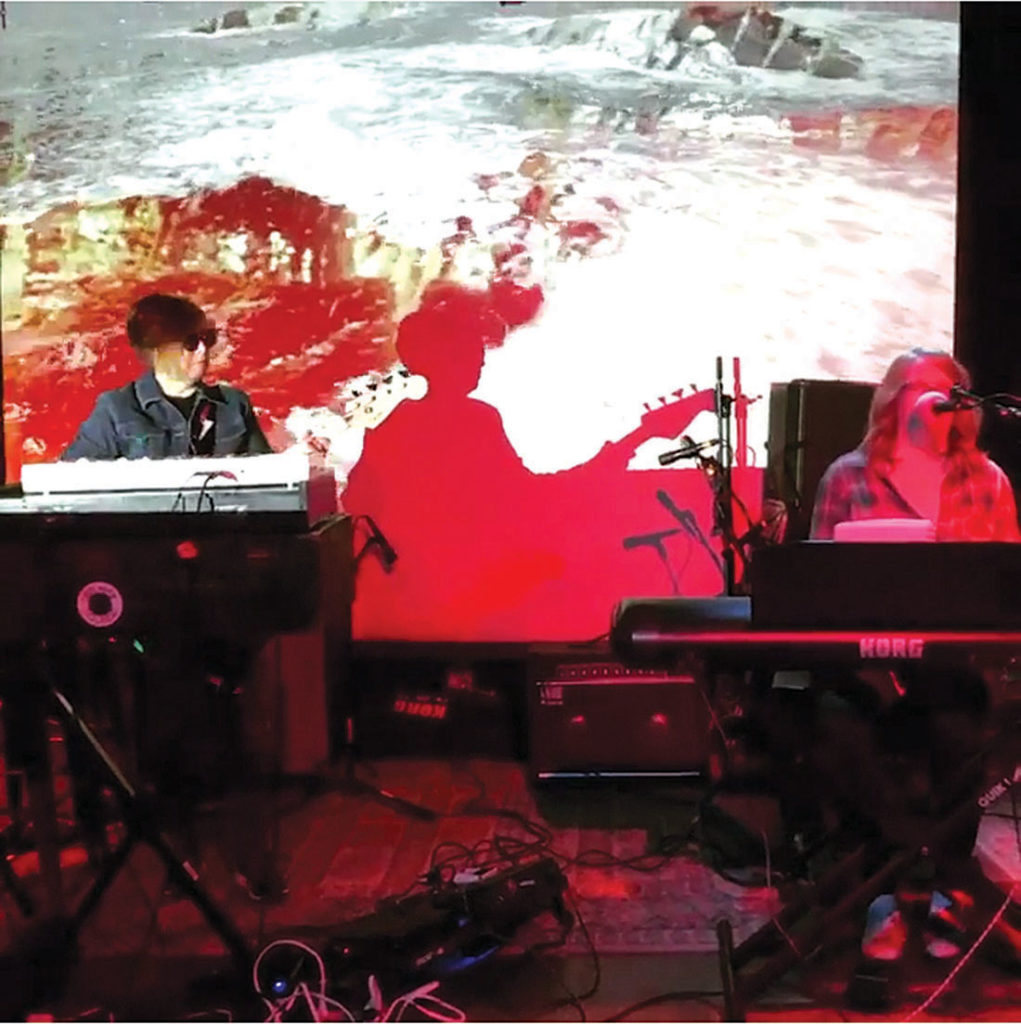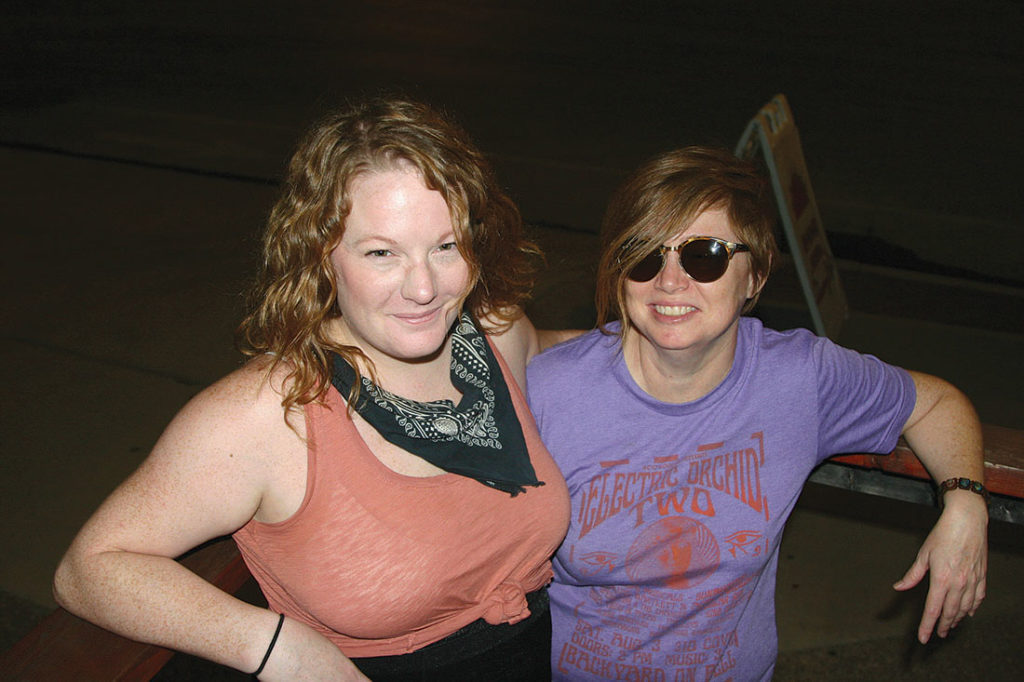Every so often, a piece of music vibrates my eardrums in just the right manner. What follows is something I call a “musical meltdown” – hearing a song for the first time and becoming instantly giddy, hypnotized, and exhilarated, like falling in love at first sound.
Once or twice a year – more, if I’m lucky – a composition will slay me. Great tunes are easy to find online, on the radio, or in the clubs, but I’m not talking about greatness. I’m talking about meltdowns that touch the deepest part of the marrow in ways I don’t even understand. Certain sound waves at random moments tap into something primal, activating the limbic and paralimbic portions of my brain to throttle dopamine into my striatum and make my heart beat faster and my pupils dilate like Jerry Garcia’s circa 1965.
I’ve been thinking a lot about musical meltdowns recently, mainly because I’m growing old and wondering whether I’ll continue having them. Meltdown songs flooded my early years but come with less frequency at 60. I suppose that’s understandable. Innocence fades. Cynicism deepens. Maybe songs struggle to pierce scarred psyches. Thankfully, though, one will burst through the walls eventually. This occurred most recently on August 6 at a Near Southside venue.
My first memorable meltdown was probably “How Great Thou Art” in the early 1960s. I was a little kid squirming on a hardwood pew and wishing ‘big church’ a slow death when next thing I knew, a melody filled this Baptist sanctuary in Haltom City and melted Little Jeffie. A preacher with a big booming voice was singing with a choir, and they filled the room with mysterious beauty. I was surprised that something that felt so good wasn’t sinful. After church, I remained quiet on the ride home in my parents’ car, running the song through my mind. I didn’t want to forget the melody. I couldn’t recall the verses but knew the chorus: “Then sings my soul, my savior God, to thee. How great thou art. How great thou art.”
My dad parked in our driveway, and everyone went inside the house to change clothes except me. I lingered and then sat on a front porch step in my Sunday best and sang the chorus quietly to myself. The words rolled off my tongue, and I felt in complete control of the melody. I even improvised some new notes to great effect, a technique that Whitney Houston and other vocalists would steal from me many years in the future. I sang louder. Louder still. I felt alive.
The sound of snickering shattered my moment. Donald, a neighborhood friend, had watched our car pull up, seen me sit on the porch step, sneaked through our backyard and up behind me, hidden behind a bush, and eavesdropped on my private performance. Instead of being embarrassed, I was annoyed. He’d interrupted a reverie so serene I recall it vividly while sitting here at my work desk a half-century later.
What prompts a musical meltdown?
Do common threads run through these special songs?
I wish I knew. I’d write a hundred hits and retire on the royalties. The melodies, lyrics, vocal styles, and instrumentation play vital roles. Still, more is at play. I’ve heard thousands of exquisite songs that didn’t provoke meltdowns.
Why does one song out of 1,000 create a near supernatural reaction?
I don’t know, but I’m thrilled when it happens.
Most likely, you haven’t heard the song that prompted my latest meltdown. The title remains up in the air, and the lyrics are still evolving. The songwriters, Katie Robertson and Jennifer Rux, together known as the band genini, are tinkering with it, and the duo has yet to record it for public consumption. But, for me, inexplicably, the song is embedded on my Meltdown List already, perched with confidence right there alongside “How Great Thou Art.”
Who am I to argue? I don’t pick my meltdowns. They pick me.
•••••

It was 11 p.m. on a Tuesday, and I was staying out later than usual during a workweek to attend Cameron Smith’s songwriter showcase at MASS. His main guest, Robertson, was about to play a solo set. I had heard Robertson perform for the first time in April at a 420 celebration with Hot Knife, a band featuring Smith (Sur Duda, War Party) and Schuyler Stapleton (Bitch Bricks). During that sound check, Robertson played a Jimi Hendrix tune on her piano that caught my attention, and I liked her voice. I wanted to hear her perform solo, so here I was four months later staying up past my bedtime in the name of rock ’n’ *yawn* roll.
Robertson climbed the steps to the tall stage while carrying a beer that she placed atop her keyboard. The bar was mostly empty. I sat at a center table near the back of the room. A man and woman cuddled at a table stage left, and a man who had come in with Robertson sat stage right. Smith and a couple of other people were perched on stools near the bar.
Robertson, who performs most often with the country-soul band Chucho, leaned into the microphone and announced she would begin her set with a few early originals that she was sick to death of playing, but they had been requested by a friend, so what the hell. That struck me as an odd way to kick off a show, but the small crowd lent itself to a casual presentation. Robertson’s so-called tired old songs turned out to be beautifully written and performed. Her voice was warm and rich. The sound system, as is typical at MASS, was spot-on. The performance was mesmerizing.
At the midway part of her set, Robertson introduced a song as being so new it was still in the process of being written with Rux as part of a fledgling band. The first piano chord caught my attention immediately. More complex than a straightforward major or minor, the triad contained a jazzy major-seventh sadness. Robertson let the chord hang in the air for an eternity. The empty space was as pretty as the sound. After a deliberate instrumental buildup, Robertson began singing two words: “Leave me.” She would croon the phrase a few times and then wail in the most soothing and melancholy way. I was transfixed but fully aware that a bona fide musical meltdown was happening, and I reached into my pocket, pulled out my phone, and captured a 30-second snippet on video.
As I’ve said, I’m not certain why musical meltdowns occur. Experts propose various theories, but for whatever reason, the song’s sparse lyricism and simple melody and who knows what else tapped into my DNA, genetics, traumas, longings, mental images, and a trillion other conscious and subconscious triggers and kickstarted my internal motor that whisked me off to a faraway place of total peace.
I could have listened to Robertson play that song for hours. I became sad when I heard her bringing it to a close and knew my night was done. I waved goodbye to her and hit the door. Once inside my car, I pulled up the video clip on my phone and listened to it again. Wow. So perfect. My house is a 30-minute drive west of town, and I listened to that 30-second clip continuously the entire ride home. If my math is correct, that means I heard it 60 times. That’s what a musical meltdown does to you.
•••••
Valorie Salimpoor, a neuroscientist who has published numerous peer-reviewed papers on the brain’s role in music enjoyment, said her musical meltdowns were so strong that she devoted her studies and career to discovering why. Scientists have long connected dopamine to the pleasure parts of the brain when people have sex or eat – actions vital to mankind’s survival.
Songs, however, aren’t necessary for survival. Why does dopamine flow when we hear music we like? Salimpoor and others theorize that people listen to a song for the first time and compare it to every other song they’ve heard, making predictions in milliseconds about what is coming next. If we guess right, our survival instincts are rewarded. If we guess wrong, we’re eaten by pterodactyls. But if we can predict too easily what’s coming next in a song, we’re bored, fall asleep, and are eaten by more pterodactyls. Or something like that. I’m no scientist. But anticipation is involved to some degree, according to this excerpt from a study that Salimpoor helped publish.
“Music is really just a sequence of sounds organized into patterns over time,” the study said. “We found that liking new music activates the parts of the brain involved in forming expectations and coding their accuracy, in combination with areas involved in pattern recognition and high-level structuring of information, and areas involved in storing templates of all of the music [listeners] have heard in the past. These templates are different for each individual and shaped by styles and genres of music they have listened to in the past. This helps explain why different people have different tastes in music. These findings suggest that music is an intellectual reward, based on integration of some of the most advanced and highly evolved parts of our brain involved in complex pattern recognition with deep subcortical pleasure centers that we share with many other animals.”
Reading that reminds me of an old joke: “For years, I wondered what was in a hot dog. Now I know and wish I didn’t.”
Over the next few days, I listened to the video clip many times. Once, while stuck in a traffic jam, the clip kept me calm and chill. On August 11, I posted the clip on my Facebook page alongside the message: “What I imagine the radio in heaven sounds like.”
Not long afterward, Robertson messaged me, saying she and Rux were going to play at MASS later that month and inviting me to attend. She said Rux had provided the “psychic analog beats, space echo effects, and delay” that allowed Robertson to “build the dreamy chord progressions and vocal melodies.”
I attended the genini show and heard the two women create a soothing, sprawling sound laced with psychedelia and techno and featuring lights and visuals to intoxicating effect. I enjoyed the show immensely but noticed my musical meltdown, which I assumed was titled “Leave Me,” had sounded much different. Rux’s echo and delay effects were strong elements, but the beats she coaxed out of her Roland Rhythm 77 drum machine filled the empty spaces that, to my ear, were crucial to the song’s power. I would have preferred fewer drumbeats or none at all.
Weeks later, Robertson was gigging at The Post Courtyard, and I stopped in after work to listen. After a while, Robertson hit that familiar chord and let it hang. My head snapped back, and she noticed and laughed into her microphone. She knew I’d been waiting for it. “Leave Me,” as I had begun calling it, sounded wonderful and moved me again. I noticed that Robertson had added a few more lyrics and vocal flourishes.
On Robertson’s break, we talked awhile, and I told her I was obsessed with the new composition and wanted to know more about it and the recording project. She invited me to an upcoming genini gig at MASS, another one, and said she and Rux would sit for an interview and photos after their set.
“See ya then,” I said.
•••••

The two women who created the song that had been driving me wild finally met with me not long ago at the venue after genini had finished a stellar set. Robertson was talking to friends inside the bar, while Rux was relaxing at a picnic table on the patio. I sat down across from Rux and complimented her on the show. We had met several years earlier when I wrote about the Bitch Bricks, an all-female punk trio that included Rux on bass. The multi-instrumentalist has also performed with The Fibs and Year of the Bear. She and husband Robby Rux are founders, owners, engineers, and producers at Dreamy Soundz Records, one of the coolest labels around and the people behind The Cush’s Transcendental Heat Wave, Ting Tang Tina’s Love Is Trippy, and the celebrated Group Therapy compilation albums among many other outstanding projects.
To work on genini, Rux said Robertson drops by the Rux household once a week for a marathon dinner and rehearsal that stretches into the wee hours.
“We’ve been writing songs and just really jamming more than anything,” Rux said. “Usually, I come up with a beat. Try to find a groove that sounds cool. I’m kind of obsessed with early electronic music. Then Katie figures out a melody. Lays another layer on piano. I lay something down on bass. Usually, I know it’s a real song when Katie comes up with a vocal melody and starts singing. It’s like, ‘Oh, shit. We got a song.’ ”
I told her I was obsessed with their song that I figured was called “Leave Me.”
“It sounds like ‘leave me’ but I don’t know for sure,” I said.
“I don’t even know either,” she said.
The song’s structure isn’t complicated, a basic I-IV-V chord progression with everything slathered in effects. The ample amounts of echo and delay make it difficult to decipher the lyrics but add an overall ambiance and dreamlike quality that contribute to the song’s signature sound.
“I started putting a lot of delay on the vocals, and I looked at Katie and said, ‘Is that OK?’ ” Rux recalled. “She said, ‘Yeah. Yeah.’ She loved it. It’s almost like the vocal is another instrument.”
As we were talking, Robertson sat down at the picnic table and lit a cigarette.
“I was saying how I’m not sure, but it sounds like you are just saying ‘leave me’ over and over in that song,” I said.
“I do say that,” Robertson said. “It depends how I’m feeling. I say ‘leave me.’ And then ‘lead me.’ There is ‘seek me.’ But mainly it is ‘leave me, leave me.’ ”
“It sounds simple enough, but what’s it mean?” I asked.
“Originally, we started thinking about this song as beyond,” Robertson said. “Like alien reaching. Like some kind of conversation happening from beyond. At the same time, I was using lyrics that made sense to me at the time. I had to spit out something to make an idea. Half the time I’m making it up with the feeling I’m having at the moment.”
I asked her what the song is called, and she said, “Blazing ’Round.”
“Is that a weed reference?” I said.
“Maybe,” Rux said with a smile.
“Every time I hear that song played, I don’t want it to end,” I said.
“It’s a hard song to quit playing,” Robertson said. “That’s what we were doing to create it – trancing out on certain progressions and playing that thing over and over again.”
This week, I spoke with Robertson and asked how genini was coming along. I had only seen the band name spelled out in print and never heard it spoken, and I mispronounced it “Jen-Nee-Nee.” Robertson laughed and said the correct pronunciation is “Jen-and-I” as in “Jennifer and I.”
The band intends to include the song on its debut album but isn’t in a hurry. At some point in 2020, you might or might not have a chance to hear “Blazing ’Round” or whatever the song is titled by then. Maybe it will make your meltdown list and provide a lifetime of memories, like the many other songs on my list.
Flash back to an outdoor party with my parents in the late 1960s. A log cabin resort kind of place. I’m playing with other kids on a merry-go-round when, in an odd coincidence, I hear “Spinning Wheel” by Blood, Sweat & Tears in the distance. The cool-sounding instruments and the guy’s big voice singing, “What goes up / Must come down” draw me to a nearby dining hall with a jukebox. I ask an adult to show me how to punch the buttons to select a song. I play “Spinning Wheel” a dozen times in a row and listen intently, mesmerized by how good the music sounds and how great it makes me feel.
Some meltdowns seem odd in hindsight. At 9 or 10, I flip over Lulu’s “To Sir, with Love,” a song written from the perspective of British schoolgirls, but the gorgeous melody, cool chord changes, and Lulu’s crystalline voice gob-smacks little me. Big me loves that song still.
In the mid 1970s, toward the end of I Walk the Line is a scene in which an older sheriff (Gregory Peck) speeds along dusty roads in his patrol car in a frantic attempt to chase down the local moonshiner’s daughter (Tuesday Weld) and profess his love. During the chase, Johnny Cash sings “Flesh and Blood.” Pubescent Jeffie had a musical meltdown during the scene, but this was long before the internet or DVRs. I heard the song unexpectedly while watching a movie, and then it was gone. Still, the melody and several lyrical phrases stuck with me. For the next few years, the phrase “flesh and blood need flesh and blood, and you’re the one I need” ran through my mind on a loop whenever I trained for track meets. The coach made us run long distances, and the “flesh and blood” chorus became a mantra that kept me in step mile after mile. Years would pass before I heard Cash’s recording again, and I was amazed at how much I had retained after one listen.
In 1989, I was 30 and driving on Highway 121 when Chris Issak’s “Wicked Game” came on the radio. The sheer beauty forced me off the highway to park on the shoulder so I could hear the last half of the song without road noise. Same thing happened in 1997 when Sarah McLachlan’s “Angel” came on the radio.
I asked Robertson if she has musical meltdowns, and she described various songs and scenes dating back to childhood. Her most recent musical meltdown occurred at a friend’s house earlier this year while listening to “A Fool for You” on the Ray Charles at Newport live album.
“I remember the moment and where I was at,” she said. “He hits this one note in the perfect moment, and it feels so heavy and so joyful at the same time. I started crying in that moment. You could feel everything he was feeling.”
My strangest meltdown occurred in my sleep in 2006. I was dozing on my couch in front a blaring TV one night and dreaming that a seductive siren was beckoning me with the most stunning song I’d ever heard. I kept following the sound, trying to find the source, unable to resist the pull, when – boom! – I woke up and realized the song wasn’t a dream but was real and being sung by a pretty woman with red hair who was sitting at a piano. Regina Spektor was singing “Fidelity” on Late Night with Conan O’Brien, and I was blown away. Immediately, I turned on my laptop and ordered the CD on Amazon. I learned the song on my guitar and sing it to this day.
I plan to do the same thing after genini releases its new song, whatever it’s called.













I know what you mean Check out a song from the 90s. Titled Twist in My Sobriety!!!
Yeah, that’s a really cool song
That’s a good read. My greatest memories of music are in 90’s and 2000’s. Although there are great tunes coming out from the last decades, the memories along with the songs from the last decades kept coming back everytime I hear them.
I received this email from a reader today:
Hi Jeff,
I enjoyed your Musical Meltdown article – just read it today – (and your other articles in FW Weekly through the years). This one really sparked memories of favorite songs. I’m not sure I would call mine Meltdowns but I definitely get the idea.
My most recent Meltdown was after watching Marriage Story on Netflix. I was already a bit sad because my daughter had just left after the holidays to return to Colorado. It was the first Xmas with her since she’d left our home for college (grad school actually). So I was going through the same sadness that I had a few months ago when we came home to an empty house from helping her get moved in at CU.
Anyway, the movie was definitely moving – but when Adam Driver sang Being Alive, that really floored me. I knew that he would sing a song in the movie because I heard that he had walked out of an NPR interview when the host wanted to play that scene. I didn’t know what the song was going to be. I imagined that it would be some ditty or possibly a lullaby that he sings to his son. Not at all expecting a full-on performance. It didn’t surprise me a bit when I heard Noah Baumbach say in an interview I saw afterwards that he basically reverse-engineered the whole movie from the scene with that song. I had my same reaction when this song was performed on a Glee episode a few years ago. It just hits me in a profound way – but within the context of the story in the movie, it was especially powerful. And so that song got stuck in my mind for days.
When I clicked on your link to your new song obsession, it reminded me of k.d. lang’s Ingenue album. I listened to that CD endlessly for days. And one of my best recent days was when my daughter and I attended k.d.’s concert in Dallas celebrating the 25th anniversary of the album where she sang each song in order. Although my daughter admires k.d. as a person and great singer, she is not the huge fan that I am. But I’m glad that we got to share that time together. The songs from the album just send me somewhere special.
Your comment about the days before the internet, got me to thinking about how my generation spent so many hours listening to the radio, oftentimes waiting to hear our new favorite song and then also collecting albums and tapes and then CDs. The instant access just was not available. A different world. But I loved that I could go on YouTube the other day after watching Marriage Story and watch many versions of Being Alive. The Bernadette Peters version I had heard before – loved it. The Neil Patrick Harris video was interesting because it put it in the context of the scene from the musical Company. But the video with Raul Esparza was one I hadn’t seen or at least didn’t remember – amazing!
Thank you for your article and transporting me back to so many wonderful songs.
Devoted FW Weekly reader,
Faeda Batchelder
Regina never lets me down..
Interesting to say the least